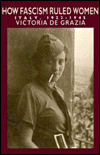

 |

|

The average rating for How fascism ruled women based on 2 reviews is 4.5 stars.
Review # 1 was written on 2019-10-28 00:00:00 Peter Barrows Peter BarrowsEnjoyed reading her views on women and fascism in Italy, and how women's roles changed under Mussolini's power. DeGrazia is very thorough in her writings, especially dealing with motherhood, growing up, and the state of women and politics during the changing time period. I had to read this for a grad level history class, and it was a good read. Very interesting although somewhat repetitive at times when discussing politics and women's role in fascism during the first two chapters. The book kind of just ends. I would have liked more of a wrap-up or conclusion to her very in-depth look at the topic. So much is written about Hitler's reign and politics, it was good to see a totally different view since I always kind of grouped Italy with Germany. The two were so different. Even though it is a somewhat dated book, it is still highly relevant as DeGrazia is so well respected in her research and writing. Recommend this book! |
Review # 2 was written on 2019-06-20 00:00:00 Bruce Leslie Bruce LeslieI had read de Grazia's great book on the spread of American-style consumer capitalism in Europe in the early/mid-20th century, so was excited to pick this one up. She situates Italian fascism's policies towards women as existing in a luminal space between the ideology's misogyny, women's efforts to make political space for themselves, and processes of modernization that both pre- and post-date the fascist era. For all of its totalitarian pretensions, the fascist state was never able to control and/or eliminate civil society the way Hitler or Stalin could. But it could promise just enough to the more bourgeois women's groups to get them hopelessly entangled with the regime while eliminating any ability to act independently. More radical groups were quashed along with the left more generally. There's a lot of interesting stuff here. The Italian right believed itself to be in demographic decline (despite the numbers showing otherwise- their real problem was male labor migrating away) which put pressure on women to be mothers. Anglo-American consumption habits were both a lure and a threat, a level of living the regime wanted to be able to promise but also resented, in part because of the way it allowed women more independence from the home. Some bourgeois Italian feminists attempted to create a "Latin Feminism," feminism that "respected Italian tradition," which basically amounted to them getting their cut of power without sharing it with women of the lower orders, but even that didn't hold the fascist regime's interest. All told, a fine historical work tracing the delicate networks of continuity and discontinuity in women's politics before, during, and after the fascist regime. ***** |
CAN'T FIND WHAT YOU'RE LOOKING FOR? CLICK HERE!!!